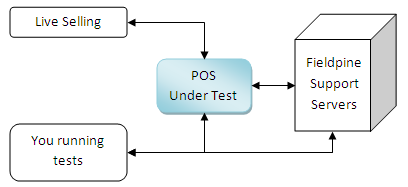
Using Automated support is similar to talking to a human specialist, just much faster, more thorough and automatic.
Fieldpine systems include advanced tools to allow remote diagnostic analysis. This speeds both problem isolation and resolution by removing the manual component from support calls.
For Users
911 Support is a program that runs on your computer and helps diagnose the issue you are having.
 It works much like a visit to the doctor; You report the problems and symptoms you are having and the doctor runs a
number of relevant tests to try and isolate the problem. With an automated system, you get the experience and skill
of top professionals in specialist areas.
It works much like a visit to the doctor; You report the problems and symptoms you are having and the doctor runs a
number of relevant tests to try and isolate the problem. With an automated system, you get the experience and skill
of top professionals in specialist areas.
To do this, the Fieldpine 911 Support tool looks at many aspects and error counters inside your computer. Comparing these to known problem patterns. While being very advanced, it breaks down problems to very simple terms for you. It leads you through a series of questions while it investigates. Of course, not everything can be solved by a computer, and so if talking to a human specialist is required, they receive all the test results and can address your issue quicker
For Support Professionals
 Fieldpine 911 is intended to be used in the early stages of
problem reporting. It ensures that rudimentary causes are trapped
early before support staff contact. It also ensures that as much relevant information is collected
before call escalation
Fieldpine 911 is intended to be used in the early stages of
problem reporting. It ensures that rudimentary causes are trapped
early before support staff contact. It also ensures that as much relevant information is collected
before call escalation
The tools look at all aspects of problem program and the operating environment, looking for anomolies and possible problems. At the same time, a large number of basic checks are performed, freeing you from needing to check basic issues such as low disk space or hardware errors. The focus is in providing resolution to problems, interpreting the information rather than just displaying data that still needs comprehending.
While the caller might be reporting problems with a printer, the diagnostic tools may detect and report that the PC has been logging serious hardware errors which could be the root cause of problems.
The support tools can be started under user action, automatically in the background, or as a service. Once started, you connect to support sessions via the internet to control the diagnostics.
Born out of DevOps, this tools ensures that calls need only be escalated to more specialised staff that do not match any known fault condition, and verifies that system environment is not faulty in some manner. For developers this means that many known problems have already been isolated and even obscure causes have already been checked. Part of the testing can also include automatic collection of key logs and traces, saving further time from requesting them.
For Developers
Fieldpine 911 is designed to ensure that once a problem, or potential problem, has been isolated the tests necessary for identificaton, reporting and repairing of the problem are pushed to the field. With computer systems becoming more and more complex, the linkages and failure surface increases exponentially. 911 will attempt to advise some of the considerations on a target system that might be causing this fault call.
By defining 'test cases' you can pre check and report known conditions, or you can gain insights into reported faults that match specific criteria - invaluable for checking potential scope of a problem. Test cases can be added to the global test library, so that users do not need to contact different vendors to analyse different applications.
My Test Case #1
when
Windows = 10
my-app-version < 5.6
file xyz.dat size > 500Mb
file errorlog.txt contains "exception at 574b"
report
text 'You have not run cleanup ....'
My Network Performance
when
ping mysite.com loss > 20%
or ping mysite.com response > 500mS
and mysite.com[status = 'ok']
check
local network errors
report
text 'There seems to be a network
performance issue to our website'
Examples of Tests & Checks
Monitored dynamically to observe activity.
The diagnostic tools do not install drivers or anything dangerous, they are only calling the myriad of available diagnostic points in various products.
